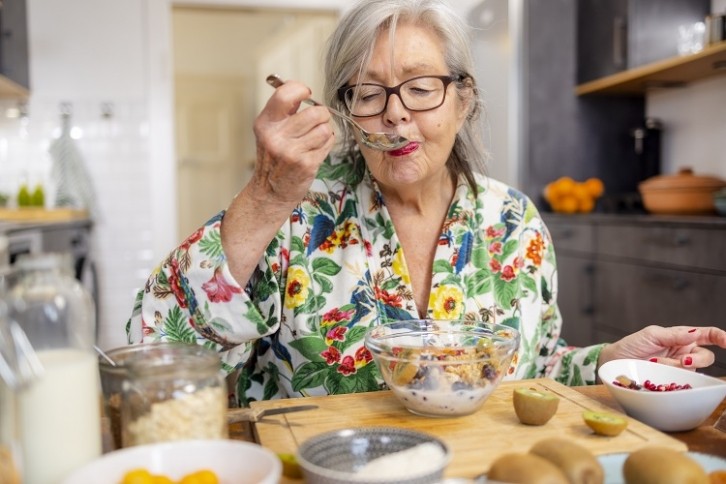What are the nutritional needs of older people?

Many age groups have unique nutritional needs. Babies and children, for example, need the right foods to effectively fuel healthy development.
Older people (those over the age of 65) are another age group with specific needs. In order to remain healthy at this crucial time in their lives, they need to ensure that they get the right nutrition. According to the World Bank, for example, over-65s made up 10% of the global population in 2022, compared with 7% in 2000.
And with the world’s population getting older all the time, especially in richer countries such as Portugal, Japan and Italy, nutrition for older people is more important than ever.
Why is nutrition for older people important?
“We now live in a century of globally declining birthrates and a rapidly aging global population,” Nestlé CEO Mark Schneider recently said on the social media platform LinkedIn.
“That’s why nutritional solutions that support healthy aging offer an important ‘tailwind’ and the opportunity for extra growth in the coming decades – it’s a mega-trend that we can make our friend!”
In short, the percentage of the population that can be considered ‘older’ is growing. Thus, the portion of the food industry will be dedicated to fulfilling the needs of this demographic is bound to grow as well.
Food targeted at older people
Very few new food product launches target over-55s. According to Mintel, for example, in 2021 only 0.0005% of new food and beverage and health and hygiene product launches explicitly targeted the age group. This is because even those in this age demographic are often reluctant to buy products specifically aimed at older consumers, as they remind them of their own age.
There are, however, some good ways to target older audiences. For example, according to Dr Craig Rose, founder and CEO of Seaweed and Co., older people are more brand loyal than younger people. Marketing on issues relevant to them, such as the menopause, is also important.
Because of the aging population, suggested Vittoria Romano, specialist dietician and chair of the British Dietic Association's (BDA) Older People Specialist Group, “there is much more focus on the nutritional needs of older adults with and without disease. NHS policy has also shone a spotlight on population health management of frailty which should include the importance of nutrition as we age, although the evidence is still evolving in this area of care.”
For example, the charity Food4Years aims to promote research into the nutritional needs of older people, as well as the development of products aiming to provide them with the right nutrition.
What nutrients do older people need the most?
Older people, according to Romano, need a different diet to younger people in order to be healthy, with differing quantities of nutrients.
“The evidence does indeed suggest that older adults have slightly different needs compared to a younger population. [We recommend] a nutrient-rich diet, choosing foods containing slightly more protein, calcium, folate (folic acid) and vitamin B12.”

However, not all nutrients need to be increased. “The amount of carbohydrates, sugar, fibre, fat, and salt you need are likely to remain the same as for younger adults.”
One important nutrient for older people is vitamin D. It helps support bones, muscles and teeth, and can guard against the softening of bones, making fractures less likely. According to the British National Health Service (NHS), Vitamin D can be found in foods such as oily fish, red meat and egg yolks.
The healthy longevity trend
An ageing population is also boosting the healthy longevity trend, the trend towards eating functional foods that may help one live for longer. The trend is about ‘living healthier for longer’, rather than simply extending one’s life. While it is a new trend, some products following it already exist, such as the company Uda’s ‘science-based longevity coffee,’ containing ingredients such as Ashwagandha, Quercetin, L-theanine, and Curcumin.
Calcium, which also builds bones, is another important nutrient suggested by the Older People Specialist Group. It can be found, according to the NHS, in milk, cheese, bread and fish where you eat the bones (e.g. sardines).
Protein, which helps maintain muscle strength, and Vitamin B12, which helps maintain energy levels, are also very important for older people.
Do older people struggle to access the right nutrition?
Some older people struggle to access the right nutrition. According to Food4Years, one in ten over-65s in the UK are malnourished.
“There can be various different reasons why older adults may struggle to access the right nutrition,” Romano told us.
“These include: food poverty [and] deprivation, being able to access shops for food shopping, [and] access to cooking facilities and ability to cook.”
Another reason that older people may struggle to get the right nutrients is the misleading nature of public health messaging, Romano suggested, which is primarily geared towards younger people and might not always be relevant to over-65s.
“Other challenges include that current population public health messaging is primarily focused on preventing obesity, weight loss being desirable and following the Eat Well Guide which is not suitable to older adults. Unfortunately we find older adults tend to follow public health messaging which may unfortunately increase their risk of malnutrition.”
How should the industry respond to older people’s nutritional needs?
While the industry is certainly responding to the nutritional needs of older people – as Nestlé’s Schneider points out, they are a growing market – in Romano‘s view it has not done so sufficiently.
“We are aware that the food industry and researchers are considering products aimed at older adults but that this hasn't necessarily reached the mainstream,” Romano told us.
If the industry wants to respond to these needs, Romano suggested, it should take into account a holistic view of nutrition for older adults.
Following the advice previously elucidated, as well as further advice on BDA's resource for older people, 'can support longevity and better quality of life in older age,' Romano suggested.












